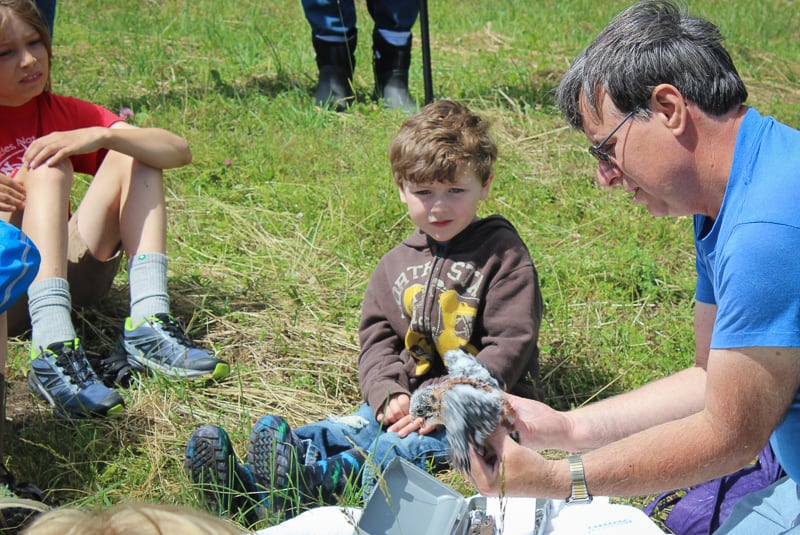Lowe honored for helping to save American Kestrels
RANDOLPH—Brian Lowe, of Randolph, has helped hundreds of American kestrels successfully hatch and fledge in Vermont and was named the winner of the 2019 GMP-Zetterstrom Environmental Award. Lowe was announced as the 2020 winner rather than receiving the honor in person, in keeping with current Covid-19 physical distancing guidelines.
The prestigious award is named for Meeri Zetterstrom, who inspired recovery efforts that led to the removal of the osprey from Vermont’s endangered species list, and it is given annually to one person, business, group or non-profit that has made a significant contribution to Vermont’s environment.
The award is accompanied by a $2,500 donation to the winner’s environmental cause.

Over a quarter-century, Lowe helped kestrels thrive despite decreasing numbers of natural homesites due to changing forest management techniques by setting up and maintaining kestrel boxes and banding hundreds of birds.
“I know Meeri would be proud of Brian and would appreciate his work,” said GMP Vice President Steve Costello, who worked on osprey recovery efforts with Zetterstrom for years. “Meeri believed it was incredibly important to look at the entire web of life, not just the most charismatic birds and animals.
“The kestrel is lesser known than many birds, but it’s a beautiful raptor and plays an important role in rodent and insect control,” Costello said.
Lowe is credited with a singular effort, uncanny in its comparison to Zetterstrom’s work. The first bird box Lowe installed was a bluebird box, which had residents within a week. Inspired, he asked a neighbor if he could put a kestrel box on his farm, and a pair made it home almost immediately. He was hooked.
Today he manages over 40 kestrel boxes each year, and bands the babies, often with school children looking on.
“It is very gratifying to hold these beautiful birds in my hand, and see the reaction of the kids – ‘Oooooooh,’” he says. “To me, it’s absolutely fantastic to be able to do this.”

“I conservatively estimate that more than 1,000 American kestrels have successfully fledged in Orange and Washington counties thanks to Brian’s efforts,” said Chip Darmstadt, executive director of the North Branch Nature Center, who nominated Lowe. “I can think of few conservation or stewardship efforts that have benefited for so long or from so much effort by one individual.
“This has been a labor of love for Brian, born out of his own initiative, and operated at his own expense,” Darmstadt said. “He is long overdue for this kind of meaningful recognition.”
Kestrels, the smallest raptors in north America, are about the size of a mourning dove. They feed on insects, small mammals, and birds. Though not endangered, according to the North American Breeding Bird Survey, kestrel populations declined 1.39 % per year between 1966 and 2017, a cumulative decline of more than 50 %, due to loss of habitat and declining prey populations.
“In his corner of the world, Brian has made a significant difference,” Costello said. “He’s worked with dozens of landowners to create a strong and vibrant kestrel population.”
Zetterstrom was known as “Grandma Osprey.” She began her efforts to restore ospreys at Milton’s Lake Arrowhead in the late 1980s. Her vision, collaboration and leadership prompted utilities, the state, and landowners to work together, and ospreys were removed from the endangered species list in 2005. The award was created shortly before she died in 2010.

Past GMP-Zetterstrom Award recipients include Sally Laughlin, a scientist whose work was instrumental in restoring three species of endangered birds in Vermont; Michael Smith, the founder of Rutland’s Pine Hill Park; Margaret Fowle, who led Vermont’s peregrine falcon restoration program; the Lake Champlain Committee, which works to protect and improve Lake Champlain; Kelly Stettner, who founded the Black River Action Team in southern Vermont; Roy Pilcher, founder of the Rutland County Chapter of Audubon; Lake Champlain International, a nonprofit working to protect, restore and revitalize Lake Champlain and its communities; Marty Illick of the Lewis Creek Association; Steve Parren, a biologist for the Vermont Department of Fish & Wildlife; and 2019 winner Eric Hanson, a biologist at the Vermont Center for Ecostudies, who helped save endangered loons in Vermont.




